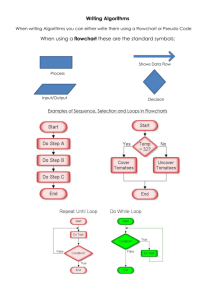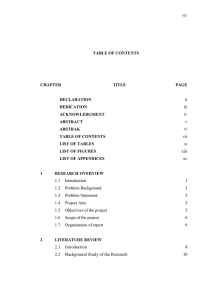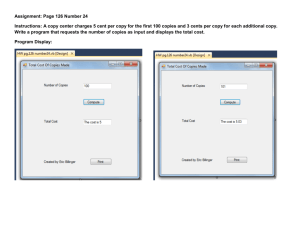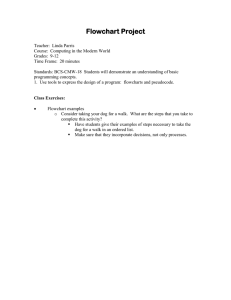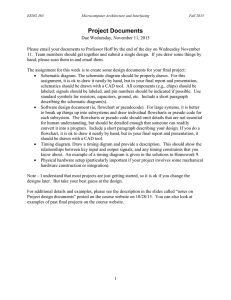lab 2.1 introduction to c programming
advertisement
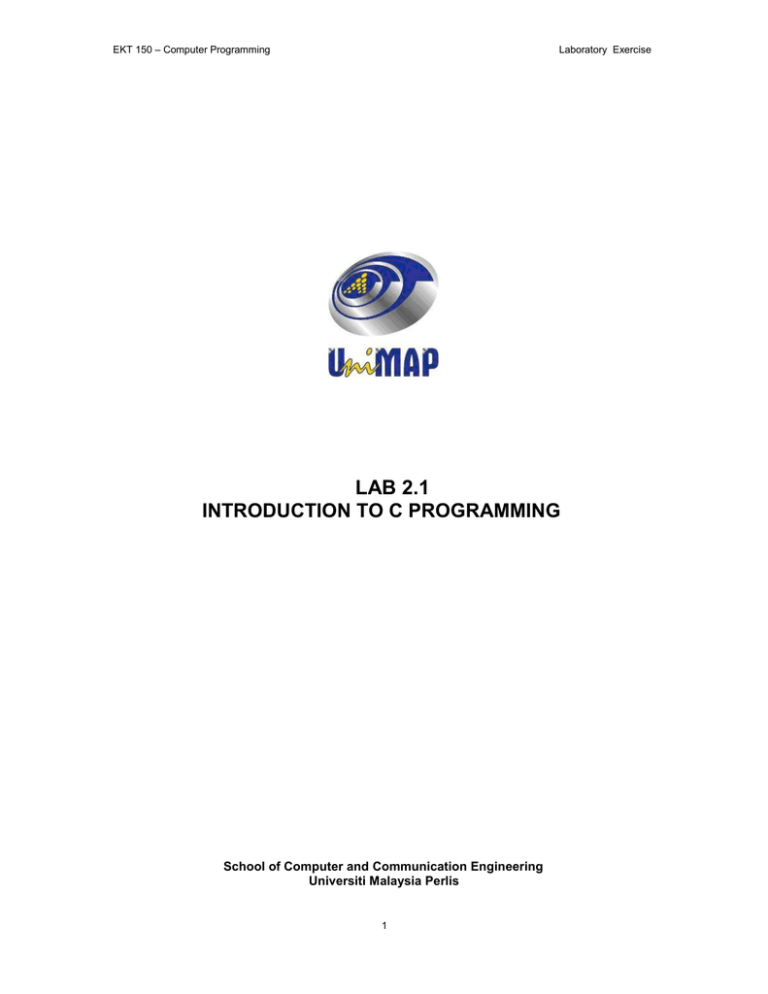
EKT 150 – Computer Programming Laboratory Exercise LAB 2.1 INTRODUCTION TO C PROGRAMMING School of Computer and Communication Engineering Universiti Malaysia Perlis 1 EKT 150 – Computer Programming Laboratory Exercise 1. OBJECTIVES: 1.1 To be able to apply basic rules and structures of C in writing a simple program. 1.2 To be able to use printf and scanf functions to display output and read input in a program. 1.3 To become familiar with fundamental data types. 1.4 To be able to name, declare, assign and print values of variables used in program. 2. TASKS: 2.1 What data types would you use to hold the following data and write C statements to declare them all. a. customer initial Data type: Declaration: b. customer name Data type: Declaration: c. your house number Data type: Declaration: d. price Data type: Declaration: e. car registration Data type: Declaration: f. time Data type: Declaration: g. 6 digit number Data type: Declaration: 2 EKT 150 – Computer Programming Laboratory Exercise 2.2 Write a statement (or comment) to accomplish each of the following: a. State that a program will calculate the product of three integers. b. Define the variables x, y, z and result to be type int. c. Prompt the user to enter three integers. d. Read three integers from the keyboard and store them in the variables x, y and z. e. Compute the product of the three integers contained in variables x, y and z and assign the answer to the variable result. f. Print “The product is” followed by the value of the integer variable result. 2.3 Using the statements you wrote in Task 2.2, write a complete program that calculates the product of three integers. 3 EKT 150 – Computer Programming Laboratory Exercise 2.4 Write a program that calculates marked area of the circle, given input from the user r1 and r2. r2 r1 a. Write down the pseudo code and flowchart for the program: b. Write your program based on pseudo code and flowchart in (a): 4 EKT 150 – Computer Programming Laboratory Exercise 2.5 Write a program to find the equivalent series and parallel resistance for 3 resistor values. Your program should scan the 3 resistor values and then compute the equivalent series and parallel resistance for all 3 resistors. For example, if the 3 resistor values are r1=100, r2=200 and r3=300 ohms, respectively, their equivalent series resistance is r1 + r2 + r3 = 100 + 200 + 300 = 600 ohms and their equivalent parallel resistance = 1 / [1/r1 + 1/r2 + 1/r3] = 1/[0.01+0.005+0.0033] = 54.55 ohms. a. Write down the pseudo code and flowchart for the program: b. Write your program based on pseudo code and flowchart in (a): 5 EKT 150 – Computer Programming Laboratory Exercise 2.6 Write a program that inputs one five-digit number, separates the number into its individual digits and prints separated from one another by three spaces each.[Hint : Use combinations of integer division and the remainder operation.] For example, if the user types in 42139, the program should print: Sample Output: Enter value : 42139 Answer : 4 2 1 3 9 a. Write down the pseudo code and flowchart for the program: b. Write your program based on pseudo code and flowchart in (a): 6 EKT 150 – Computer Programming Laboratory Exercise Additional Exercises: 2.7 Write a program to calculate the distance travel using the given formula below: 2 S = vt + ½ at In your program ask user to input through keyboard the value of: v = initial velocity a = acceleration t = time of travel a. Write down the pseudo code and flowchart for the program: b. Write your program based on pseudo code and flowchart in (a): 7 EKT 150 – Computer Programming Laboratory Exercise 2.8 Write a program to take a depth (in kilometers) inside the earth as input data; compute and print the temperature at this depth in degrees Celsius and degrees Fahrenheit. Data Requirements Problem Input double dDepth /*depth in km*/ Problem Outputs double cCelcius double dFahr /*temperature in degrees Cescius*/ /*temperature in degrees Fahrenheit*/ Relevant Formulas Celcius = 10 (depth) + 20 /*Celsius temperature at depth in km*/ Fahrenheit = 1.8 (Celsius) + 32; a. Write down the pseudo code and flowchart for the program: b. Write your program based on pseudo code and flowchart in (a): 8
